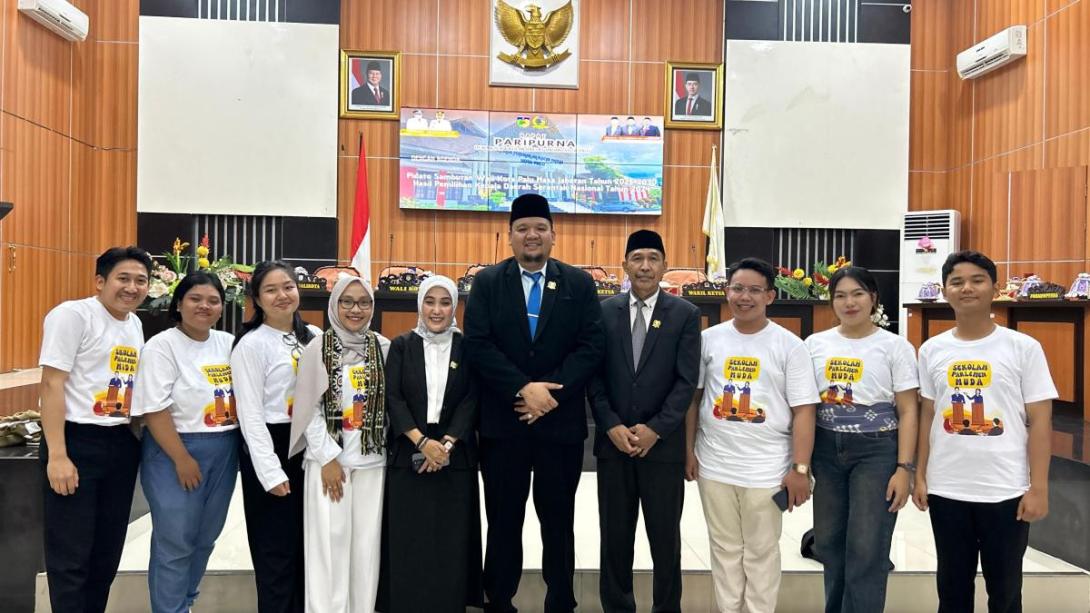
Political education is important. Political issues are very diverse, finding solutions is an urgent need. Through the Young Parliamentary School, I hope to understand how the policy-making process works and how we, as the younger generation, can make a real contribution to it. For me, change starts with small things.
— Participant of Young Parliamentary School
The goal of the project is to emerge and increase young people’s interest and participation in politics through Young Parliamentary School
Main Objectives:
- Provide learning instruments and facilitate knowledge and networking experiences with young and female parliamentarians
- Gather diverse youth and women’s perspectives and experience on their level of participation in politics through the use of feminist participatory action research (FPAR) and Co-design
- Providing political education practices directly to young people through peer parliamentarians to get involved in political and parliamentary activities
- Disseminate information on the performance and profile of young parliamentarians and women to the public as a form of public accountability.
Nur Safitri Lasibani’s Project, organized by the Sikola Mombine Foundation, has a long-term goal of increasing women's representation in leadership positions in politics through a youth-centered approach. To achieve this goal, political education for young people becomes the main approach. Using the co-design method with a Feminist Participatory Action Research (FPAR) approach, the team conducted data collection through desk analysis and community consultation with 20 young people from various backgrounds: students with disabilities (low vision), students from remote areas, non-social sciences faculty students, students with married status, students from pre-prosperous families, Chino (China-Indonesia) students, students with different gender orientations, students with HIV/AIDS, and students from diverse religious backgrounds (Charismatic Christian, Christian, Muslim, and Hindu) to explore issues of women, youth, and vulnerable groups in their political participation and plan joint actions such as political education, policy advocacy, and public campaigns.

Through the Young Parliament School, 5 young people selected from diverse backgrounds have the opportunity to participate in a series of meetings at the Palu Regional City Council, such as plenary meetings, commission meetings, special committee meetings, deliberative body meetings, regional regulation formation body meetings, budget body meetings, and to participate in RESES or constituency aspiration gathering. This program has connected young people with their parliament members, learning about the political system, public policies, and developing critical thinking towards the political situation and policies in the region, so that they will become young people with a vision of gender-just and inclusive leadership, where this program truly emphasizes the diversity of representation. Young people have learnt from the figures of young and female politicians, highlighting their profiles, performance, and what they will do for the city's residents, including understanding the issues raised in the community. This project provides a larger quota for female representation than for males, considering that female representation in parliament and the public sector is still low (far from the 30% female representation affirmative policy). Although the representation of women in parliament is still low, with 35 members in total, consisting of 28 men and 8 women.
Participants of the Young Parliamentary School are also equipped with various trainings such as Budget Analysis, Active Citizenship, and Citizen Journalism with a Gender Perspective. They have produced 1 document on macro budget analysis / trend analysis of the Palu City Regional Budget for the last 3 years (2023-2025) as well as sectoral analysis of environmental issues, a public report on the implementation of RESES as a basis for budget allocation according to community aspirations for the following year, and creative content as a campaign and political education for the general public.
By increasing their political participation, starting from awareness of using their voting rights, actively participating by providing political education to the public to choose candidates based on their values, avoiding money politics practices, being rational voters and promoting women candidates who have a good perspective on gender issues, then we will also see an increase in women's participation in politics, especially in parliament. (Nur Safitri Lasibani)

